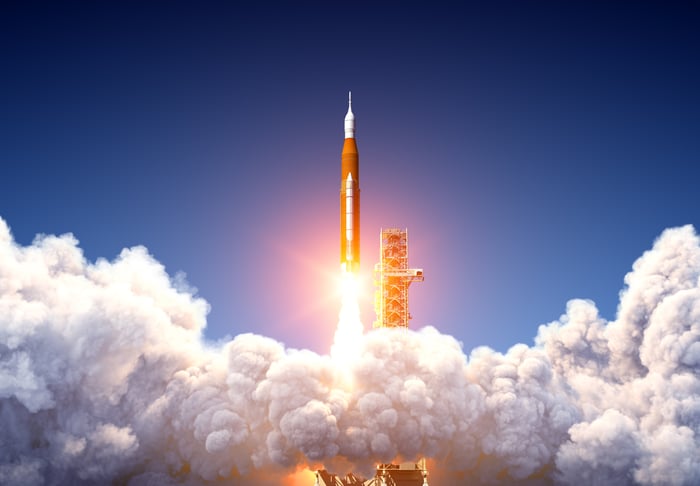"Space" isn't Lockheed Martin's (LMT 1.31%) biggest business. At $11.2 billion in revenue last year, it actually came in third out of the defense company's four main business units. "Space" isn't Lockheed Martin's most profitable business, either. With just $1.2 billion in operating profit, space contributed least to the bottom line of any LockMart business unit in 2019.
But come next year, "space" could be the reason that Lockheed Martin both books more revenue and earns more profit than it's ever done before.

Image source: Getty Images.
Acquiring Aerojet
How will that happen? Late last year, Lockheed Martin announced plans to acquire and merge into its own space operations rival rocket company Aerojet Rocketdyne (AJRD) in a $5 billion all-cash transaction. Assuming shareholders approve and regulators allow it, sometime in the second half of 2021 Lockheed Martin will either (a) pay Aerojet shareholders $56 for each share they currently hold, or (b) permit Aerojet to pay its shareholders a $5 special dividend in March, then pay the remaining $51 per share in cash to acquire the company later in the year.
All of that sounds pretty straightforward. But it still leaves the big question: Why would Lockheed Martin want to own Aerojet in the first place, and why would it be willing to pay so much to own it?
Defense contractor math
After all, by Lockheed's own admission $56 per share represents a 33% premium to Aerojet's closing stock price on Dec. 18, the last trading day before the acquisition was announced. $56 per share values Aerojet at 2.25 times sales, a near-50% premium to Lockheed's own 1.5 P/S ratio, and at 36.5 times trailing earnings -- more than twice Lockheed Martin's own 15x earnings valuation.
This might make sense if Lockheed Martin was "buying growth" -- meaning paying a premium to acquire a company with a much stronger expected growth rate than its own. But in fact, according to analysts polled by S&P Global Market Intelligence, Aerojet is only expected to grow its earnings at about 7.2% annually over the next five years. Lockheed Martin, in contrast, is expected to grow at 7.3%.
In short, from a valuation perspective at least, Lockheed Martin appears to be seriously overpaying to bring Aerojet in-house.
So why do that?
What Aerojet brings to the table
Different analysts look at Aerojet in different ways. My fellow Fool and defense specialist Lou Whiteman, for example, notes that Aerojet Rocketdyne serves as "a key supplier on a number of Lockheed missiles and other products," such that buying Aerojet would "help Lockheed Martin expand its expertise in key areas including hypersonics."
This could be one reason why Lockheed wants to own Aerojet. As Lou has previously pointed out, "Lockheed Martin has won most of the big contract awards in hypersonics," and, with billions of dollars worth of Pentagon contracts at stake, it makes sense that Lockheed might want to control as much of the supply chain as possible as it scoops up these contracts.
A second Aerojet technology that Lockheed may be eyeing is the company's AR1 rocket engine, first proposed to power United Launch Alliance's (ULA) new class of Vulcan heavy lift rockets in 2017. At first it might seem logical for Lockheed to want to own this engine, inasmuch as it's a 50-50 owner of ULA and its Vulcan. In 2019, however, ULA decided to not use Aerojet's AR1 for Vulcan, but to go with a new BE-4 rocket engine from Blue Origin instead.
And that would seem to make AR1 an engine in search of a rocket -- and a customer.
Elsewhere in space, Ars Technica's Eric Berger observes that, prior to announcing its interest in Aerojet, Lockheed didn't play much of a role in NASA's gigantic Space Launch System project. Although Lockheed is the prime contractor building the Orion space capsule that sits atop SLS, Lockheed doesn't currently play a major role in construction of the rocket itself. Buying Aerojet -- which is contracted to build the core-stage engines on SLS, and the rocket's upper-stage engines as well -- ensures that "Lockheed will make hundreds of millions of dollars from every launch," whether SLS carries an Orion or not.
For me, the interesting thing about Lockheed acquiring Aerojet is that before the behemoth didn't have a stake in SLS. Orion and the rocket might have been decoupled. Now, Lockheed will make hundreds of millions of dollars from every launch.
-- Eric Berger (@SciGuySpace) December 21, 2020
If you ask me, though, this is a strategic mistake. Over budget and behind schedule, SLS is a program in serious danger of being canceled by NASA, catching flak from both legislators in Congress and the Office of Management and Budget alike.
In the White House, no one knows whether the incoming Biden Administration will view SLS favorably. And complicating matters further, at NASA itself, one of the rocket's most vocal defenders, NASA administrator Jim Bridenstine, announced in November that he plans to leave the agency after Biden takes office this month.
In short, SLS's future is in serious doubt. Lockheed Martin may want Aerojet to profit from future SLS launches, but that will only happen if SLS does, in fact, eventually launch. At last report, NASA was still planning to attempt a first launch in November 2021.
You can bet Lockheed Martin has its fingers crossed.





